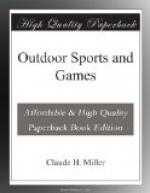There is a very practical side to nature study and the principal way that we can make it really pay, is to know our friends from our enemies in the animal and insect world. There are insects that chew, suck and bore to ruin our orchards and grain crops. They are our enemies. If we know their life story, where they hide and how they breed, we can fight them better. For every dollar’s worth of crops that a farmer grows, it is estimated that his insect enemies eat another dollar’s worth. A little bug called the “San Jose” scale has nearly ruined the orchards of some of the Eastern states. To fight him, we must know how he lives. That is nature study. By study we learn that the hop-toad is our best garden friend. He will spend the whole night watching for the cutworms that are after our tomato plants. When we see a woodpecker industriously pecking at the bark of our apple trees, we know that he is after the larvae of the terrible codling moth and we call him our friend.
After we learn that a ladybug lives almost entirely on plant lice and scale insects, we never kill one again except perhaps to place a specimen In our collection. Naturalists say that without ladybugs, our orchards would soon be entirely killed off.
The dragon fly or mosquito hawk as well as “water tigers,” water striders and many kinds of beetles are the natural enemies of mosquitoes and as they never harm our crops we should never harm them. Nearly every living creature has some enemies.
You have perhaps heard the famous verse of Dean Swift:
“So naturalists observe,
a flea
Has smaller that upon them
prey
And these have smaller still
to bite ’em
And so proceed ad infinitum.”
[Illustration: An observation beehive]
Among our insect friends the leading place belongs either to the honey bee or the silkworm. As silkworms are not especially successful in this country and as their principal food, mulberry trees, are not common, the nature student who cares to study our beneficial insects had better devote his attention to honey bees. An observation beehive is simply a glass box or hive instead of a wooden one. When we are not engaged in studying our bee city, the hive must be covered with a blanket as bees prefer to work in the dark. A boy or girl living in the country can also keep bees profitably and thus combine business with pleasure. A single hive will in a few years produce enough swarms to give us a good start as “bee farmers.”
X
THE CARE OF PETS
Cats—Boxes for song birds—How to attract the birds—Tame crows—The pigeon fancier—Ornamental land and water fowl—Rabbits, guinea pigs, rats and mice—How to build coops—General rules for pets—The dog




